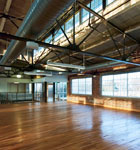It was a natural for the city of Conover, North Carolina, to look to Tise-Kiester Architects (TKA) when creating the Conover Multimodal Center. The architecture firm has focused on adaptive reuse since its inception in 1987. “The adaptive-reuse projects are, and have been attractive to the firm on a number of levels,” says Phil Kiester, co-owner of TKA. “They secure a significant piece of local history for future generations, generate revenue for the immediate community, and they are inherently sustainable due to the reuse of existing facilities.”
Formerly known as D.O. Tise Architects with Don Tise at the helm, the company shifted gears when Kiester came on board as an architect in 1991. Over the next three years Tise and Kiester developed the business, and Kiester became an equal partner in 1995. Though always interested in sustainability, the focus has increased for TKA in the past 10 years. Additionally, Robyn W. Heeks, LEED AP BD+C, has taken the lead in developing new sustainable strategies for the firm. On every project, from churches to commercial buildings to homes, TKA takes advantage of any opportunity to include sustainable features. “Our goal of sustainability begins with site selection and building siting and extends to product selections and finishes,” Kiester says.As an extension of that goal, TKA’s Chapel Hill office is located on the top floor of a former mattress factory built in 1923. “Being downtown in a historic building allows us to put resources back into the local community while also reinforcing the local, historic built environment,” Kiester says.

The interior of the Conover Multimodal Center is rife with materials left over from the existing structure. In addition, the building will use 35% less water and 30% less energy than comparable facilities.
For the Multimodal Center, TKA was officially brought on through its brownfield consultant, and the firm worked with the city to develop a master plan for the site and repurposing of the building. Previously a factory belonging to the Warlong Glove Company and later to Conover Furniture, the center now serves as the main stop between Charlotte and Asheville on the Western NC Rail, currently in development. Completed in November 2011, the project includes a reading room / lending library on the upper level, offices for the regional bus company on the main level, and dedicated community space on the lower level.
Aside from bringing its adaptive-reuse skills to the table and encouraging the use of public transportation, TKA concentrated on incorporating specific features to help the center earn LEED Gold certification. Siting and orientation were central focuses, including for a circulation core that was designed to engage the landscape by facing a future public park. “An observation deck overlooks the park, and an adjacent roof’s structure has been augmented to support the addition of a green roof in the future, further connecting the Multimodal Center to the landscape,” Kiester says.
Other features include new windows and high-efficiency HVAC equipment that will help the building achieve nearly 30 percent greater efficiency than required by code. Because of the emphasis on water efficiency, the building will use 35 percent less water than a comparable facility, and both original and local building materials were used.
Though sustainability is a factor in every project Tise-Kiester Architects completes, the firm does not lose sight of the client. This has led to years of success. “Many architects provide a high level of service, and many include sustainability in their discussions with their owners,” Kiester says. “We try to provide a high level of design service at a reasonable price and [to] treat everyone with an appropriate level of respect.”

